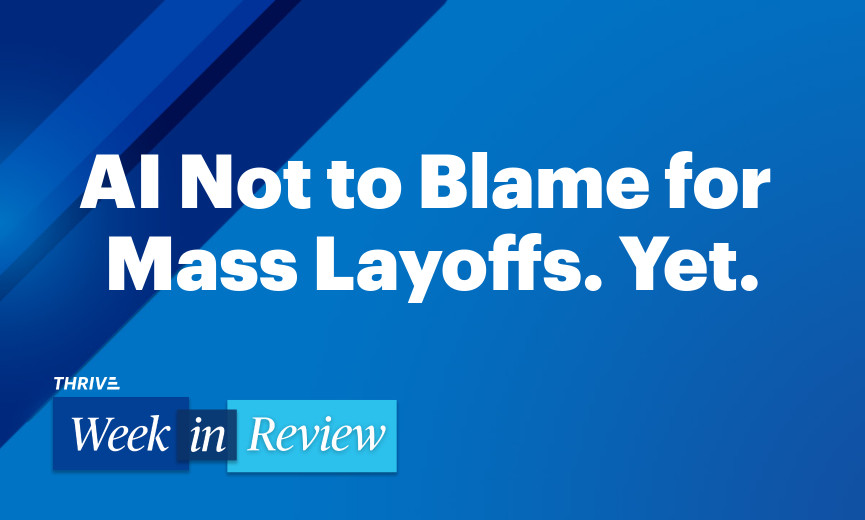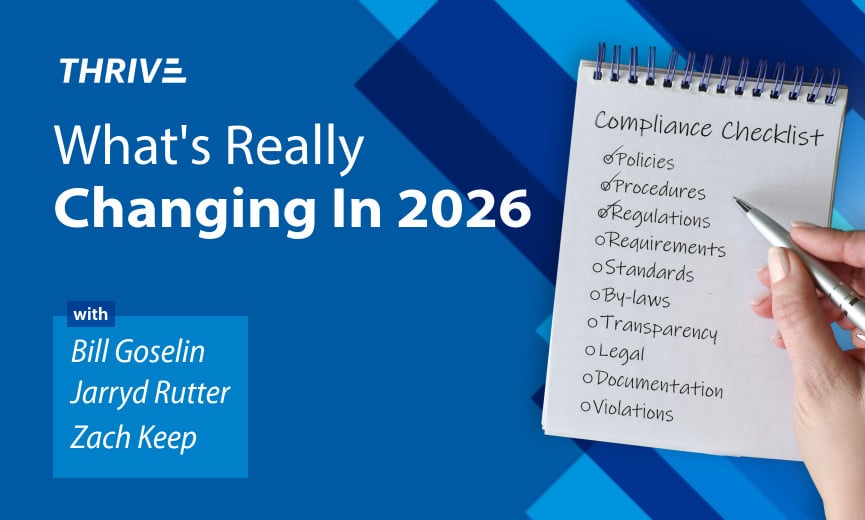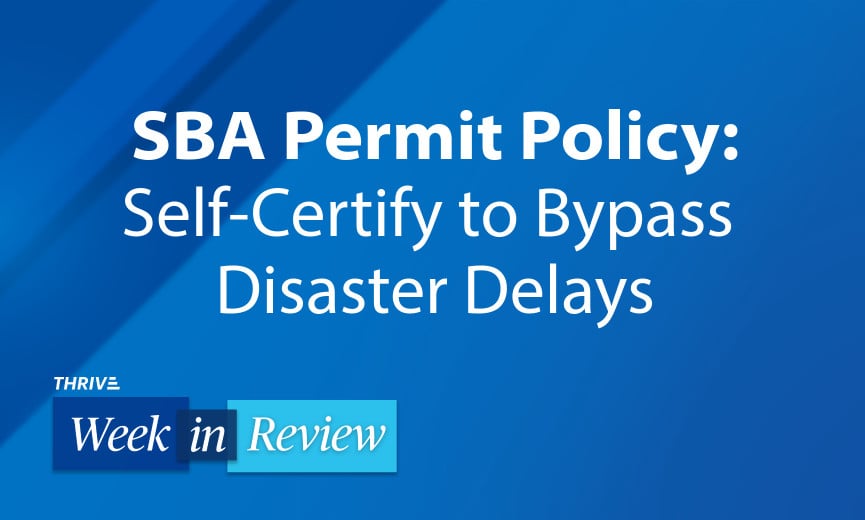- Thrive
-
Season
4Episode95
What’s Next for Interest Rates? Credit Cards for Financing? Automation Investment?

Podcast •

Summary
With inflation expected to settle in at around 3%, far below the elevated percentages that sparked the Federal Reserve to hike interest rates so high, the question is what will the Fed do now? Gene Marks has an idea of where they might go and shares them on this week’ episode, along with his insights on using credit cards to finance your business and why an automation trend might benefit franchisees and other small businesses. Listen to the podcast.
View Transcript
[Gene Marks, host]
Hey everybody, this is Gene Marks, and welcome to another episode of Paychex THRIVE Week in Review podcast. This is the podcast where every week we take a look at news that's impacting your small business and I give you thoughts on how, if, when, and why it impacts you and what you can do. So, let's get to it, okay.
The first bit of news from this past week comes from the Wall Street Journal, and it was widely covered news about inflation in the U.S. There's good news. Price gains have slowed markedly from the 40-year highs that were recorded last year, particularly when looking at a gauge of underlying or core inflation that excludes volatile food and energy prices.
So, the latest inflation data shows this. It shows that the risk, without a further slowdown in the economy, inflation might settle around 3%, which is well below the alarming rates that prompted a series of rapid Federal Reserve rate increases last year. But it's still above the 2% inflation rate that the Central Bank has set at its target.
The Consumer Price Index rose 3.7% from a year earlier, the Labor Department said last Thursday, the same as in August but far below the 9.1% recorded in June 2022. Core prices rose 4.1% from a year earlier, down from 4.3% in August. On the month, they increased 0.3% in September for the second straight report after smaller gains in June and July.
The big question, guys, is what is the Fed going to do? Are they going to continue to raise interest rates? Well, according to the Wall Street Journal report, Fed officials have signaled that they are likely to hold short-term interest rates steady at their next meeting, which is scheduled at the end of October, because a run-up in long-term interest rates over the past month could slow the economy.
In effect, if the rise in borrowing costs are sustained, that would substitute for rate rises. Right now, the mortgage rates are between 7 and 8%. That is not great for the real estate industry, and the prime rate is about 8.5% nationally, which is not great for businesses because most of my clients are paying one to even three points above prime. So, if they're getting new financing or refinancing existing working capital equipment loans, they could be paying 9.5 and 10.5% interest which is a lot higher than what was being paid before.
The good news is that the Fed itself might be slowing down or reconsidering whether or not it's going to raise rates any further. There is still a threat that they were going to do that before the end of the year, but with inflation somewhat coming under control, it seems as if they might hold off on doing that. That'll bring some relief. The big question is are those rates going to start coming down? I wouldn't be too optimistic about that. I'm looking sometime in the next 6 to 12 months before we start seeing rates start to decrease, which means the cost of financing and borrowing are going to remain high for the next year or so.
The next bit of news actually was reported in the CPA Practice Advisor, and it has to do with credit cards. It's a new report that came out from Intuit and also from the University of Chicago. The report says that many areas of the economy have rebounded or thrived since the pandemic has ebbed, but amid high inflation and high interest rates, small businesses are increasingly turning to credit cards for operational and growth expenses. That is from the new report from Intuit and the University of Chicago.
Some more data for you: Small businesses have more depended on their credit cards, the current spending being about 20% higher on average on credit cards than they were before the pandemic. At the same time, their monthly credit card payments, which include interest charges, are up 26% on average.
Now, the report points out that access to funding is essential for small business growth, but roughly half of small businesses in the U.S., Canada, and the U.K. are self-funded by the owner. New businesses and businesses owned by women or members of underrepresented racial groups often face greater funding challenges.
So yeah, more and more businesses are turning to credit card financing to fund their businesses.
What do you think about using your credit card to fund your business? I'm going to tell you what I think. I think if there's return on investment, you can go ahead and do that. Credit card rates can be excessive; there's no question about that. I mean, you know, typically they're anywhere from 18 to 25%. So, it's certainly not a long-term solution.
But if you need to borrow money short-term off of your credit card, maybe to put down a deposit on a on a, you know, a new lease location or a small piece of equipment or for some inventory, and, you know, you're going to turn that around into something more profitable that's going to give you a return on investment that will not only pay back the credit card fees or interest, but also obviously give you a profit, you don't have to turn away from it.
Credit card financing is not evil. Even any other short-term financing with high interest rates. I get it when people get scared, when they see double-digit inflation rates, but it's not an evil thing. I have a lot of clients that have used credit cards in the past to help finance their businesses – short-term. They've swallowed those rates.
And remember, even when you hear a 20 or a 25% rate – that’s an annual rate. If you've got an outstanding a balance for two, three, four months, you're going to pay more than a typical loan, but good luck getting that loan in this environment, right.
So, credit cards can provide a crucial form of financing for you, and as long as you do the math and make sure that you're paying it back and you are still profiting and it's providing a return on investment, then hey, I'm all for it. I do not think, I don't like the whole current narrative that credit card financing is a bad thing for small businesses. There are certainly better options, but if you don't have those options available, it could be your only thing. Just make sure you're getting return on investment.
Finally, there was a really cool article in the Franchise Times just this past week about Marco's Pizza Delivery chain that has announced that they will provide franchisees with autonomous vehicles for delivery.
Well, Marco’s Pizza isn't the only franchise that is turning towards automation internally. Chipotle is testing a new robot that automates the process of assembling burrito bowls and salads, and there are other chains, as well. I wrote about this recently; I forget if it was The Guardian or The Hill, but I was pointing out fast-food chains that were using a piece of equipment called Flippy, which flips hamburgers. White Castle is automating the creation of their burgers, as well. Lots of fast-food chains are doing this.
The reasons are obvious. I mean, obviously, if they can't, we have a labor shortage. It's very tough getting hourly workers to work at these businesses. So, you know, a lot of these people are turning toward automation to help them with it.
Now, you might say that buying this equipment is expensive and it certainly can be. Financing is available for this. But what caught my attention about this article in the Franchise Times was that it's the franchisor – it's Marco's Pizza Delivery, the chain, the corporate headquarters. They're providing these autonomous vehicles for their franchisees, and I think that's where the key is.
I think if a lot of the chain restaurants finance this on a corporate level, make those investments and there's types of automation and help their franchisees, you know, share the cost and the burden of putting in this technology, I think it's a potential win-win, you know, for the long term.
Now, autonomous vehicles; not so sure about that. I don't know if there's like a self-driving pizza cart going down the street, I'm not quite sure how long that would last in my neighborhood. I don't know about yours. But besides that concept, the idea of automation in fast-food restaurants and retail stores in general and restaurants, it is becoming more and more popular, more and more affordable, and something that I'm hoping more larger corporations will invest in for the benefit of their smaller franchise owners.
So, if you are a franchise owner, ask your franchisor what they're doing about technology and how they might be able to help you invest in automation so you can stay ahead of the game and make up for the shortage of labor that we're going through right now.
My name is Gene Marks and you are listening to this week's Week in Review podcast, the podcast is brought to you by Paychex THRIVE. If you have any questions or would like to make any suggestions or suggest a guest, please visit us at payx.me/thrivetopics.
Thank you so much for listening this week. We'll be back next week with three more items in the news that impact your business and some thoughts on it, how it impacts, and what you can do.
Again, my name is Gene Marks. We'll see you then. Take care.
This podcast is property of Paychex, Inc. 2023. All rights reserved.

 Apple Podcast
Apple Podcast Spotify
Spotify iHeartRadio
iHeartRadio








